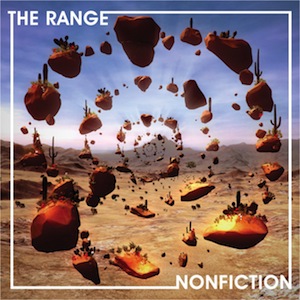The Range Nonfiction
Bass music’s permeable borders have provided an especially fertile ground for Rhode Island upstart James […]

Bass music’s permeable borders have provided an especially fertile ground for Rhode Island upstart James Hinton, who has racked up a respectable buzz in recent months with his musical exploits as The Range. Dabbling in jungle, footwork, stoner head-nodders, warped beats, and melodic chillout, Hinton specializes in wrangling together a celebratory pastiche of styles. His debut full-length, Nonfiction, for Brighton’s cheeky leftfield-bass-and-beats label Donky Pitch, is the producer’s clearest iteration of this compacted melange yet, a record steeped in nostalgia that still succeeds in solidifying his own particular voice.
Thoughtfully laid out, Nonfiction moves through a calculated series of peaks and valleys that balance the enterprising producer’s penchant for throwback D&B breaks and vintage rave warmth with moments of rap reflection and relative calm. “FM Myth” trills with high-pitched digital horns and foggy echoes before being engulfed in the muffled muttering of an indiscriminate grime sample and the clamor and crash of a jungle beat. One long crescendo, the track peaks out to make way for the more melodically minded “Hamiltonian.” Matching lush string arrangements and piano with an uncharacteristically subdued footwork rhythm, it in turn segues into the mellow and classically minded piano of “Postie,” which could best be described as a juke R&B ballad.
It’s this conscious ebb and flow—both within his compositions and from track to track—that makes Nonfiction such a compelling listen. A cut like “Jamie” sits relatively still, establishing an instrumental hip-hop base, shimmering atmospherics, a few sampled lines from a rap verse, and little else, only to be followed by “Seneca,” which stirs from its opening of tick-tock beats and plucked string textures to morph into a dense composition bursting with double-time drums, chimes, and rich layers of piano.
At the same time, Hinton isn’t writing every song to be his next big single. Some, like nu-jazz shuffler “Everything But” or the liquid roller “Sad Song,” sink into the mix without warranting much attention, likely by design. Even set closer “Metal Swing” freaks what sounds like a field recording of a novice rap rehearsal into a playful final diversion, but it attempts little more. These tracks add texture to the album without vying for the spotlight and make the sum bigger than its parts. Given that, and Hinton’s ability to coalesce such a broad palette of sounds into the neat package presented here, it’s certainly fitting that he’s chosen to call himself The Range.

